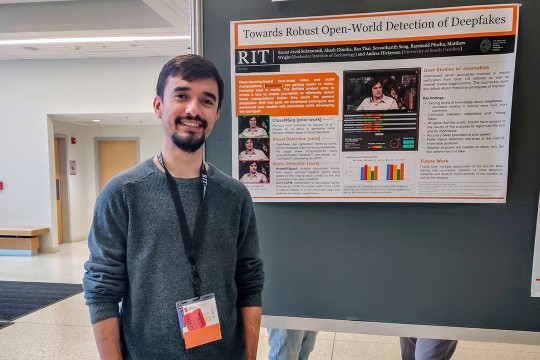News by Topic: Research
-
April 6, 2022
![professor observing as a student uses a pipette.]()
Study: Cultural competence key in mentoring deaf and hard of hearing undergrads
ASBMBToday, a publication of the American Society for Biochemistry and Molecular Biology, features the RIT-RISE project.
-
April 5, 2022
![professor and student working with imaging equipment.]()
Satish Kandlikar recognized as a top researcher in his field by Research.com
Satish Kandlikar, professor of mechanical engineering, has been recognized by Research.com as one of the country’s top researchers in his field. This first edition of the national and international rankings of more than 3,600 mechanical and aerospace engineering scientists from around the world included Kandlikar, who ranks 31st in the U.S., and 54th in the world ranking.
-
March 31, 2022
![student posing with research poster.]()
RIT’s Graduate Showcase celebrates scholarship April 7
From robot waiters to river otters, RIT’s Graduate Showcase will cover a wide variety of topics representing graduate scholarship from the university’s Henrietta and global campuses. The symposium, held April 7, will feature oral presentations in the morning and poster presentations, demonstrations, and visual exhibitions in the afternoon.
-
March 31, 2022
![poster reads: Redefining possibilities, graduate students on the move, April 4 to 8, 2022.]()
RIT Graduate Education Week and Showcase kicks off April 4
RIT will highlight graduate student scholarship during the 14th annual Graduate Education Week and Showcase, April 4–8. The theme of this year’s symposium is “Redefining Possibilities–Graduate Students on the Move.”
-
March 30, 2022
![A prototype of a photonics circuit.]()
RIT researchers contribute integrated photonics technology to develop new point-of-care system for diagnosing coronavirus
RIT’s team will develop the technology needed for a point-of-care diagnostics system built on integrated photonics. Capable of accurate detection of SARS-CoV-2 antibodies, the new system could reduce the need for expensive equipment and specialized expertise to better inform care decisions in underserved, resource-limited communities.
-
March 28, 2022
![professor and students watching another student use a pipette.]()
RIT scientist receives NIH grant to study viruses with potential to treat prostate cancer
The National Institutes of Health are funding RIT scientists to explore vesicular stomatitis virus’s (VSV) potential for treating prostate cancer. Associate Professor Maureen Ferran from the Thomas H. Gosnell School of Life Sciences secured a three-year, $451,718 Research Enhancement Award (R15) grant from the NIH to investigate prostate cancer cells’ susceptibility to the virus.
-
March 25, 2022
![chassis of an electric vehicle.]()
National manufacturing institute led by RIT marks five years
A national manufacturing institute led by Nabil Nasr, associate provost and founding director of RIT’s Golisano Institute for Sustainability, is marking five years of accelerating the transition to a circular economy in the United States.
-
March 24, 2022
![athlete in a batting cage swinging a baseball bat.]()
College of Health Sciences and Technology and RIT baseball partnership creates biomechanics lab
Students and faculty from the exercise science program are using high-speed cameras, motion capture technology, and other sensors to analyze the motions of RIT baseball players as they swing the bat.
-
March 22, 2022
![image of the butterfly nebula in greens and reds.]()
Featured Image: A Cosmic Butterfly Spreads Its Wings
AAS NOVA features a Hubble Space Telescope image created by an RIT team led by Joel Kastner, professor in the Chester F. Carlson Center for Imaging Science.
-
March 21, 2022
![group of students standing with dean near a display of magazine and writing samples.]()
College of Liberal Arts honors students for writing excellence
Diverse subjects involving safety and autonomous automobiles, Black women in computing, and Italian cinema are just some of the winning entries for this year’s student writing awards, sponsored by RIT’s College of Liberal Arts.
-
March 21, 2022
![man wearing hard hat collecting weeds next to a cornfield and a road.]()
Environmental evolution: RIT part of the largest-ever study
WROC-TV talks to Kaitlin Stack Whitney, assistant professor in the Department of Science, Technology, and Society, about her team's research on white clover.
-
March 17, 2022
![white clover plants.]()
RIT scientists part of massive study on clover showing urbanization drives adaptive evolution
RIT contributed to a massive study on a tiny roadside weed that shows urbanization is leading to adaptive evolution at a global scale. As part of the Global Urban Evolution Project (GLUE) project, scientists from 160 cities across six continents collected more than 110,000 samples of white clover plants in urban, suburban, and rural areas to study urbanization’s effects on the plants.





















